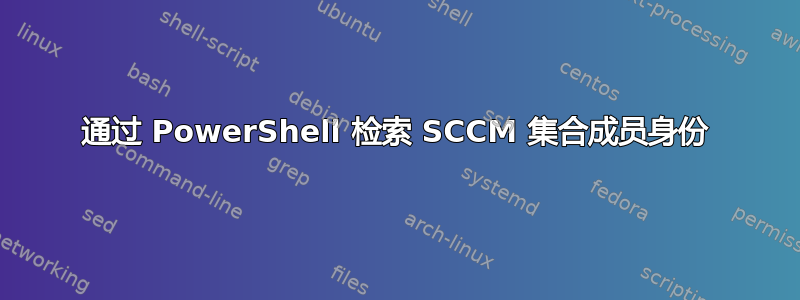
我想找到一个 PowerShell 脚本来检索给定计算机或用户的 SCCM 集合。我知道这可以通过 SCCM 查询来实现,但我想使用 PowerShell 函数来实现。
该脚本应适用于 SCCM 2007 和 SCCM 2012。
答案1
以下是执行此操作的 PowerShell 函数:
$Server = "sccm-01"
$site = "S01"
Function Get-Collections
{
<#
.SYNOPSIS
Determine the SCCM collection membership
.DESCRIPTION
This function allows you to determine the SCCM collection membership of a given user/computer
.PARAMETER Type
Specify the type of member you are querying. Possible values : 'User' or 'Computer'
.PARAMETER ResourceName
Specify the name of your member : username or computername
.EXAMPLE
Get-Collections -Type computer -ResourceName PC001
Get-Collections -Type user -ResourceName User01
.Notes
Author : Antoine DELRUE
WebSite: http://obilan.be
#>
param(
[Parameter(Mandatory=$true,Position=1)]
[ValidateSet("User", "Computer")]
[string]$type,
[Parameter(Mandatory=$true,Position=2)]
[string]$resourceName
) #end param
Switch ($type)
{
User {
Try {
$ErrorActionPreference = 'Stop'
$resource = Get-WmiObject -ComputerName $server -Namespace "root\sms\site_$site" -Class "SMS_R_User" | ? {$_.Name -ilike "*$resourceName*"}
}
catch {
Write-Warning ('Failed to access "{0}" : {1}' -f $server, $_.Exception.Message)
}
}
Computer {
Try {
$ErrorActionPreference = 'Stop'
$resource = Get-WmiObject -ComputerName $server -Namespace "root\sms\site_$site" -Class "SMS_R_System" | ? {$_.Name -ilike "$resourceName"}
}
catch {
Write-Warning ('Failed to access "{0}" : {1}' -f $server, $_.Exception.Message)
}
}
}
$ids = (Get-WmiObject -ComputerName $server -Namespace "root\sms\site_$site" -Class SMS_CollectionMember_a -filter "ResourceID=`"$($Resource.ResourceId)`"").collectionID
# A little trick to make the function work with SCCM 2012
if ($ids -eq $null)
{
$ids = (Get-WmiObject -ComputerName $server -Namespace "root\sms\site_$site" -Class SMS_FullCollectionMembership -filter "ResourceID=`"$($Resource.ResourceId)`"").collectionID
}
$array = @()
foreach ($id in $ids)
{
$Collection = get-WMIObject -ComputerName $server -namespace "root\sms\site_$site" -class sms_collection -Filter "collectionid=`"$($id)`""
$Object = New-Object PSObject
$Object | Add-Member -MemberType NoteProperty -Name "Collection Name" -Value $Collection.Name
$Object | Add-Member -MemberType NoteProperty -Name "Collection ID" -Value $id
$Object | Add-Member -MemberType NoteProperty -Name "Comment" -Value $Collection.Comment
$array += $Object
}
$array
}
只需根据您的环境调整 $Server 和 $Site 变量的值。
以下是如何使用此功能的示例:
Get-Collections -Type computer -ResourceName PC001
Get-Collections -Type user -ResourceName User01
结果将是一个表格,显示与计算机或用户相关的集合 ID、集合名称和注释。
希望这可以帮助!
答案2
一颗小宝石。。谢谢你。。
我稍微做了一些改动,将站点/服务器变量放在参数下,以便我可以将它放入我们自己的模块中。
param(
[Parameter(Mandatory=$true,Position=1)]
[ValidateSet("User", "Computer")]
[string]$type,
[Parameter(Mandatory=$true,Position=2)]
[string]$resourceName,
[Parameter(Mandatory=$false,Position=3)]
[string]$Server = "sccm-01",
[Parameter(Mandatory=$false,Position=4)]
[string]$site = "S01"
) #end param


